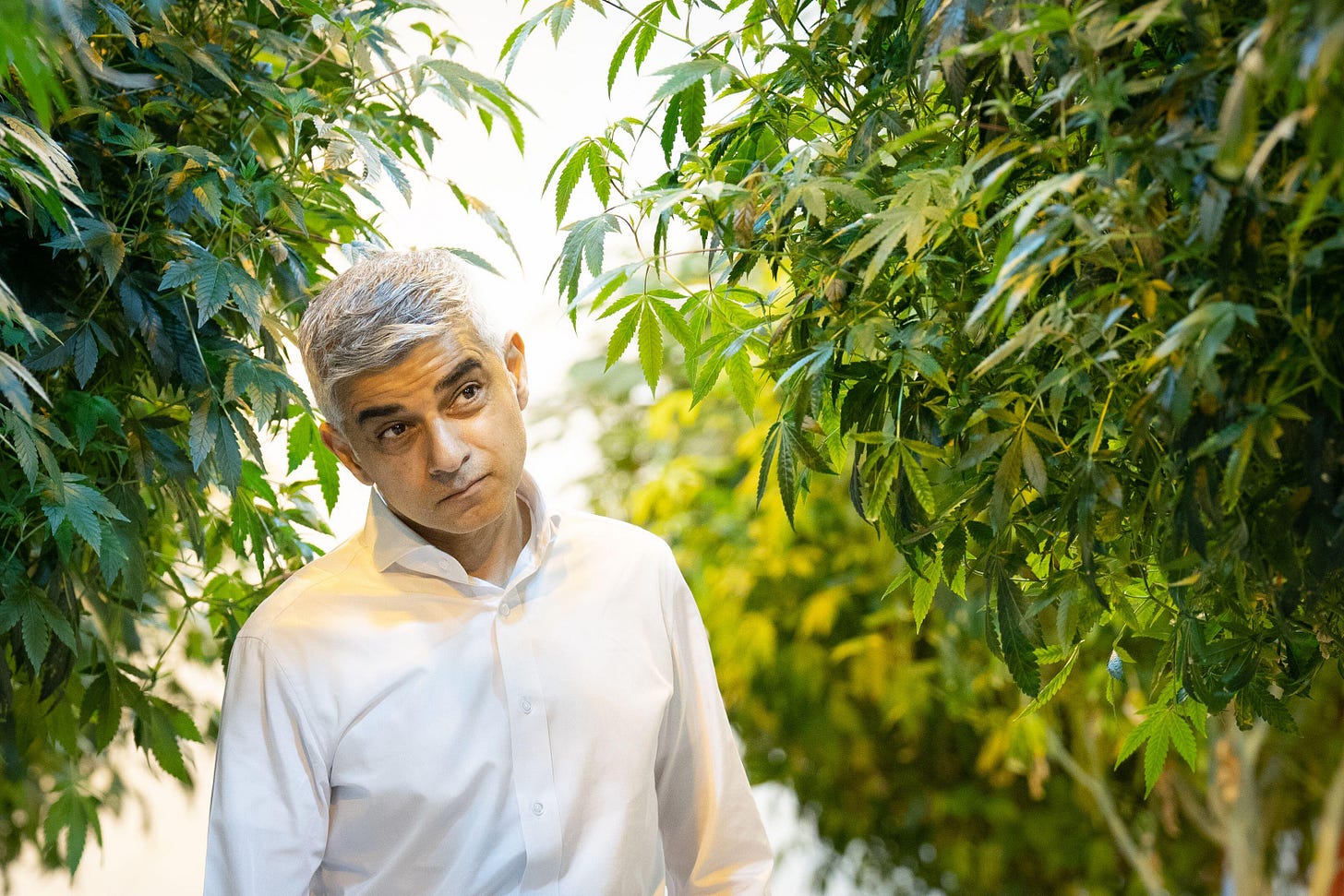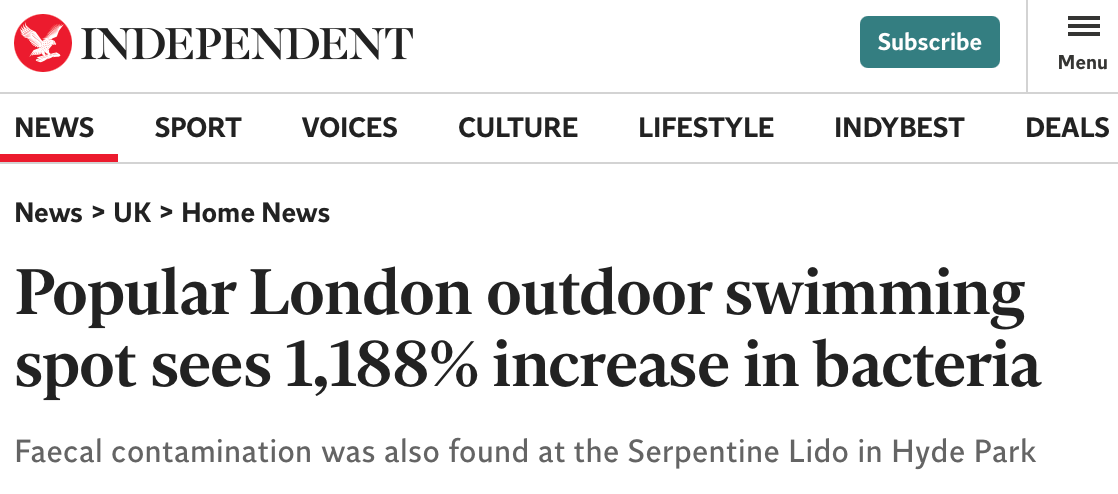Sadiq Khan: Some cannabis possession should be decriminalised
Plus: The closure of a once-giant London newspaper, Lime bike ecstasy pills, and is the water in the Serpentine really as bad as the headlines would suggest?
Possession of small amounts of natural cannabis for personal use should be decriminalised, according to a massive review of drugs policy in London endorsed by Sadiq Khan, which has concluded the existing policy is racist and is used by the Metropolitan police as a justification to stop and search young black men.
The mayor said the findings of the London Drugs Commission are “compelling” but he has no power to change drugs law in the capital. His call for decriminalisation was immediately rejected this morning by the national Labour government.
Khan’s drugs commission was led by Charlie Falconer, a former Lord Chancellor who was in charge of the justice system during Tony Blair’s government and remains well connected in Labour circles.

Falconer phoned London Centric to talk us through the key findings of his three-year research project.
He told us:
Police officers, including in London’s Metropolitan police, are using the excuse that they smell cannabis as a way to stop and search people. Falconer said officers take this approach “disproportionately against black men” despite “no evidence” that black people are more likely to use cannabis. He described current enforcement of cannabis possession laws as an “incredible friction point between the police and black communities”.
Full legalisation of cannabis should be rejected. Falconer opposed a US-style model where cannabis can be openly sold and taxed in the majority of states, arguing “legalisation is not a panacea”. He expressed concern that legalisation might lead to increased use of cannabis, which can cause “adverse consequences” such as schizophrenia. “I don’t want to replace Big Tobacco with Big Cannabis”, he added.
Decriminalising the possession of small quantities of unadulterated natural cannabis could save the criminal justice system “hundreds of millions of pounds” and free up court time to deal with other issues. He said 45% of all criminal drugs cases involve cannabis – a “complete waste of state time” that “unfairly stigmatises” possession. Dealing cannabis would remain illegal.
He said decriminalisation “could be done very quickly legally”, requiring a simple “statutory instrument” that moves cannabis from the Misuse of Drugs Act to the newer Psychoactive Substances Act. This would criminalise dealing but not criminalise possession.
Decriminalising cannabis possession would also allow the government to treat the drug and the adverse consequences that some users face as “a health issue rather than a criminal justice issue”.
Decriminalisation is different from legalisation. It removes the criminal penalties for holding cannabis but does not legitimise the entire supply chain.
The challenge for Khan, who promised the drug review way back in 2021 as part of his re-election campaign, is that he has few ways to influence how drugs laws are enforced in the capital. In some ways the document is best seen as a way for Khan and City Hall to lobby central government, while also drawing a dividing line between him and the central Labour party on the issue of drugs.
This approach has its risks and might not win any friends: Home secretary Yvette Cooper, who smoked cannabis in her youth, was reported to be annoyed when Khan first announced the drugs commission in case it led to Labour being portrayed as soft on crime. Overnight her department declared they have “no intention” of reclassifying cannabis from its current status as a Class B drug.
Falconer told London Centric this is an issue “where the public may be ahead of the politicians” and people on the street know enforcement of cannabis possession law is “theoretical rather than real”.
He said his three years of work on the project, backed up by specialists in drug policy, was the most substantive work on the topic in 20 years: “I very, very, very much hope that central government takes notice of what we’re saying, and seriously considers whether or not there should be this change.”
Don’t stop wild swimming just yet
After reading the Independent's recent article on "dramatically" rising levels of dangerous E coli bacteria at some of the capital's wild swimming spots, we decided to take a plunge into the topic ourselves.
Good news for swimmers: you're safe for now.
According to the Independent’s article, Hyde Park's Serpentine Lido saw its levels of E. coli – a type of bacteria that can cause diarrhoea – increase by 1,188% between 2023 and 2024, while the Hampstead Heath mixed pond's levels increased by 230%. The research appears to have been provided to the Independent by the “Bathing Mobility Advisory Service”, a private company that sells walk-in baths and seeks publicity by placing water-related stories in the media.
What the research doesn't say is that this dramatic percentage rise is more indicative of unusually low levels in 2023 than dangerously high ones in 2024, with E coli levels at both ponds comfortably meeting the Environmental Agency's criteria for either 'good' or 'excellent' all year long. Current bacteria levels at both spots remain low, the Environmental Agency's weekly water quality tests show.
Water quality in London's rivers has been a major talking point in recent years, as is the case across the country. Struggling Thames Water's large-scale sewage discharges into the capital's waterways are rivalled by the "quiet, steady, background poisoning" of misconnected sewers in individual properties, as London Centric waded through excrement to reveal in March. Luckily, it seems the ponds are mostly protected from such leaks by the origin of their water: the content of the Heath's ponds comes from small springs arising nearby in the park, while the Serpentine is fed by groundwater and some rainwater runoff.
One of the most talked-about articles on London in the last few days has been this Guardian piece on gentrification in the capital and the argument that redevelopment is driving out families, causing schools to close. Dave Hill, the writer of OnLondon, has a counter-argument that one of the biggest issues affecting London’s birthrate is the increasingly-common issue of the capital’s ageing population, as the middle-aged decide not to move out to the suburbs and stay put in the centre of the capital. This is breaking the traditional churn of property that freed up space for young families, a trend that London Centric has previously identified in Transport for London’s data on how Londoners get around.
The agony and the ecstasy of Lime e-bikes
One reader of this publication — you know who you are — got in touch to say that their friends have recently been buying large quantities of green ecstasy pills imprinted with the ubiquitous green logo of Lime e-bikes. Sadly this reader was unable to share a photo (possibly because the pills had already been consumed) but drugs testing charity The Loop has provided us with the photographic evidence

Katie Porter, chief executive of the Loop, told London Centric it depended on which particular “pill presses” are being used by manufacturers at any given time and the choice of branding is about “keeping the market interested, keeping something different.”
The Lime logo on the pills is, in effect, an endorsement of the e-bike brand’s cool – albeit an endorsement that the company would not want to be associated with. “It’s what’s in the common media at a given point,” said Porter. “It’s clothing brands, particular people, or figures in the media. They will look to see they’re in common parlance.”
This doesn’t mean all Lime bike ecstasy pills on the streets of the capital will be the same strength, especially since popular designs are rapidly copied by other manufacturers: “You can’t say the ‘Lime bike pills are X’ because it’s an unregulated market but sometimes there can be conversations between people who are purchasing and using them - ‘these are good, these are OK’.”
She said her charity, which tests illegal drugs, first saw Lime pills last year. But manufacturers often change logos on an annual basis. As a result, a potential test of Lime’s ongoing cool will be whether its brand makes this year’s drug dealer shortlist: “We’re about to go into a testing period for the summer. This will be when we start to see newer and different presses coming in for the summer season.”
The days of being able to drive an electric car into central London without paying the congestion charge are over. The incentive, introduced to encourage drivers to switch to cleaner vehicles, has in some ways been too popular for its own good. As the country increasingly shifts to electric vehicles, Transport for London concluded congestion was rising as more drivers are able to head into town without paying the fee, prompting the decision to phase out the existing policy. From 2026 the discount for electric vans will be cut to 50% of the £18/day fee, with electric cars receiving a discount of just 25%. These discounts will then be halved again in 2030.
The South London Press, one of the capital’s longest-running newspapers, appears to have gone bust after 160 years. Richard Cawley, the outlet’s sports editor, announced its demise on Tuesday by declaring: “Really sad news. South London Press is no more...Can't say didn't expect this day to come though.”
In recent years South London Press had tried to fight back under the banner of London News Online, covering much of the capital. Its sports coverage also kept the outlet alive. But the reality is that, with print newspaper sales collapsing and advertising revenue not making up the difference, many local news outlets are inevitably shifting to a reader-supported model to pay the bills — with all the challenges that brings.
Older readers may remember the South London Press’ large sign on its office above Elephant and Castle tube station, although in recent years it was in Catford. In its honour, we bring you this classic front page from 2005, as highlighted by former Lib Dem mayoral candidate Rob Blackie — we can only aspire to breaking a story about the capital’s rodents being off their faces on drugs.
London Centric’s reporting is paid for by people who are willing to support traditional, on-the-ground journalism about the capital. If you’re able and willing to become a paying subscriber then your support is much appreciated.
Feedback is always appreciated via WhatsApp or email, or leave a comment.







Honestly cannabis should be legalised, regulated and taxed. It’s less dangerous than alcohol and tobacco and making it illegal isn’t stopping people consuming it. We’re just giving a valuable revenue stream to criminals that could be going to taxpayers instead. I’ve gone to the cannabis dispensaries when I was in NYC and was able to calmly ask what was a low strength edible to try and it was delightful. It was much better than drinking. When are we going to stop fight the US’ war on drugs. It’s failed and we’re just wasting time a resources that could be spent on more important crime. I wish our politicians were more ambitious.
Pure coincidence: We’ve published at the same time and covered almost the same things. The Longer London Minute! Or maybe mine is London Centricish.